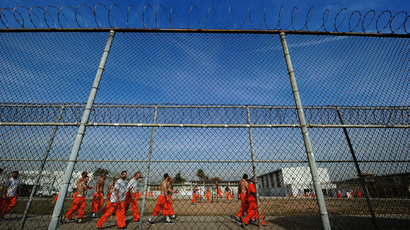Over 3,200 US prisoners serving life sentences for non-violent offenses including shoplifting – report

Over 3,200 people in the United States are serving life sentences without parole for non-violent and often petty offenses – and taxpayers are paying billions to keep them locked up, according to a new report.
The American Civil Liberties Union (ACLU) report, titled ‘A
Living Death,’ relays the stories of thousands of people
impacted by the United States’ “late-twentieth-century obsession
with mass incarceration and extreme, inhumane penalties” which
leaves them likely to die behind bars even though they are far
from being serious or violent offenders.
From possessing a bottle cap smeared with heroin residue to working as a middleman in a $10 drug sale, the ACLU says that punishment thought to be reserved for the most violent criminals in the US is also meted out to others - oftentimes for minor crimes.
Of the 3,278 people across the country serving life sentences without parole, the vast majority surveyed by the ACLU - 83.4 percent - received the punishment that was mandatory under sentencing laws, leaving the judge no other choice.
In January 1996, Timothy Jackson was caught stealing a jacket from a department store in New Orleans. A few months later, he was convicted of shoplifting and sent to prison. He is still incarcerated for stealing the $159 jacket.
“I know that for my crime I had to do some time, but a life sentence for a jacket value at $159...I have met people here whose crimes are a lot badder with way less time,” Jackson, now 53, told the ACLU.
Jackson’s sister, Loretta Lumar, told the Guardian that her brother’s life sentence is still difficult to digest.
“This doesn't make sense to me,” she said. “I know people who have killed people, and they get a lesser sentence. That doesn't make sense to me right there. You can take a life and get 15 or 16 years. He takes a jacket worth $159 and will stay in jail forever. He didn't kill the jacket!”
Not long after Jackson received life in prison, a Louisiana appeals court found the sentence “excessive,” “inappropriate,” and “a prime example of an unjust result.” The court called him a “petty thief,” and threw out the sentence.
The next year, the state supreme court echoed those sentiments. “This sentence is constitutionally excessive in that it is grossly out of proportion to the seriousness of the offense,” wrote Judge Bernette Johnson. Yet the state's stubborn four strikes law, which mandates life without parole, led her to reinstate the sentence.
There are many other stories in the report: someone condemned to life in prison for siphoning gasoline from a truck; another for helping steal tools from a tool shed; one for trying to cash a stolen check; a woman carrying a small amount of drugs for an abusive boyfriend; a man who stole a wallet from a hotel room.
Thanks to the drug war, most of the non-violent prisoners were sentenced in the federal system. Nine states are holding prisoners that are serving life sentences without parole for violent offenses. Louisiana has the highest amount, while Alabama, Florida, Mississippi, Oklahoma, and South Carolina also have high totals.
The US holds 2.3 million people in jail, the highest incarceration rate in the world. Drug offenses are an overriding factor in the American penal system.
Seventy-nine percent of the non-violent offenders serving life sentences without parole were convicted of non-violent drug crimes.
Overall, the ACLU calculates that $1.8 billion is spent to hold these prisoners for life.
About 65 percent of the prisoners identified in the report are African-American. In Louisiana, that proportion goes up to 91 percent.
“The racial disparity can result from disparate treatment at every stage of the criminal justice system, including stops and searches, points of arrest, prosecutions and plea negotiations, trials, and sentencing,” attorney Jennifer Turner, who authored the report and corresponded with more than 600 prisoners, told The Nation. “In Louisiana, it may also have to do with how prosecutors wield their enormous discretion in deciding whether to charge defendants as habitual offenders.”
The report shows that many of the non-violent offenders suffer from mental illness or drug dependency, or were mired in poverty.
Turner says the US is “virtually alone in its willingness to sentence non-violent offenders to die behind bars.” Life without parole for non-violent sentences is a violation of human rights, according to the European Court of Human Rights. The UK is one of only two countries in Europe that still uses the sentence, but has done so only in 49 cases involving murder.
In addition to life-without-parole sentences, many others serve 100-year or other stacked sentences that are, in effect, for life.
“The number of people serving death-in-prison sentences after being convicted of nonviolent crimes is not known but it is most certainly higher than the number of prisoners serving formal life-without-parole sentences for nonviolent crimes,” the report states.
All in all, the totals reveal that the US is sentencing 400 percent more people to life without parole than it was 20 years ago.
“The explosion in life without parole sentences is part of a larger, failed approach to criminal justice – an approach characterized by unnecessarily and unproductively extreme penalties,” the ACLU says. “The result? An aging prison population that costs more and more to lock up as their health deteriorates, strapped state budgets, and too many people locked up for too long.”
The report calls on state and federal sentencing laws that mandate or allow life without parole for non-violent crimes to be abolished. In addition, it calls on state governors and the Obama administration to commute those with outsized sentences.
In addition, the ACLU touts alternative solutions, including shorter prison terms and more drug treatment and mental health services.
“Life without parole sentences for nonviolent offenses defy common sense and are grotesquely out of proportion to the conduct they seek to punish,” the report concludes.














